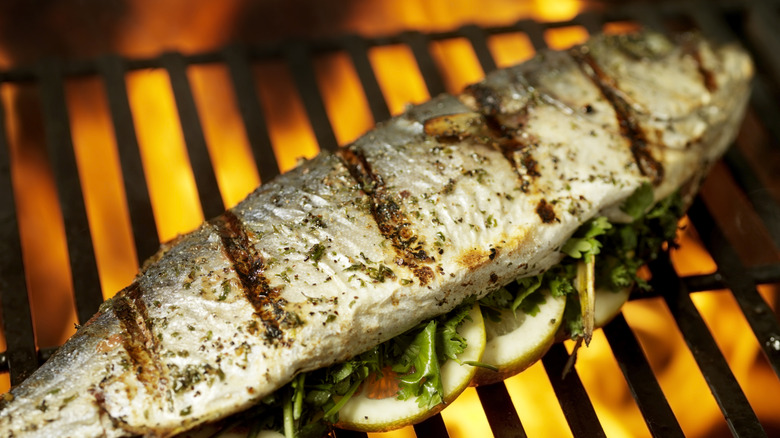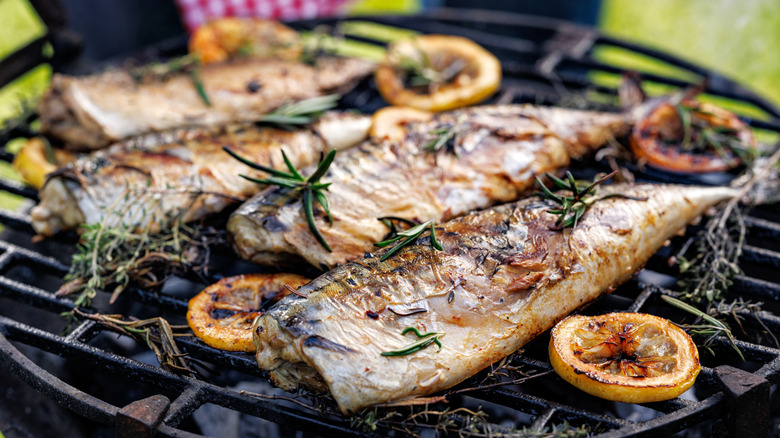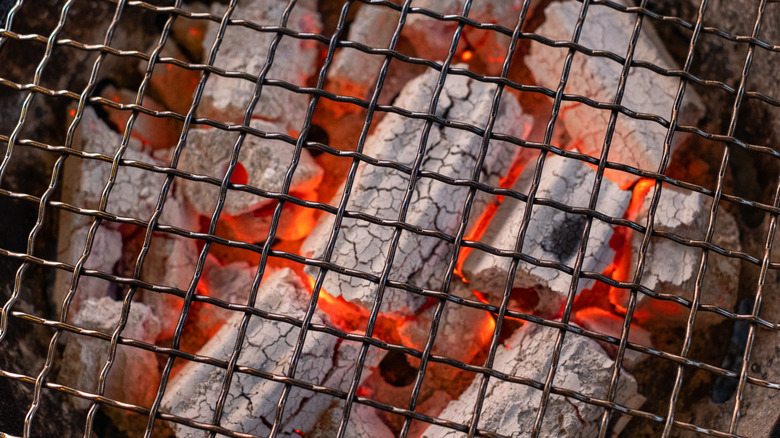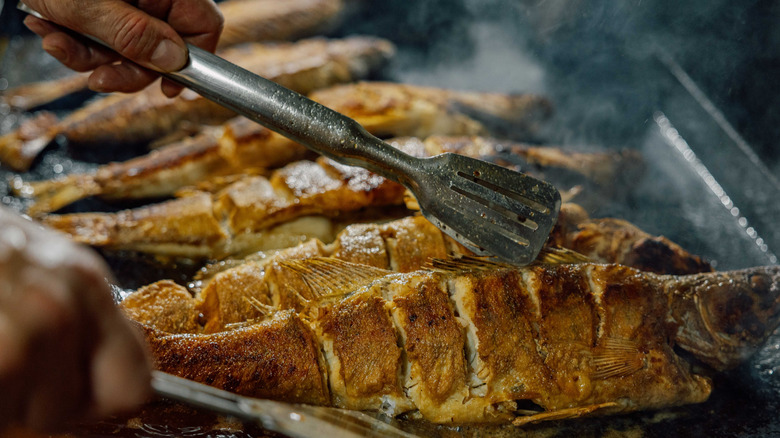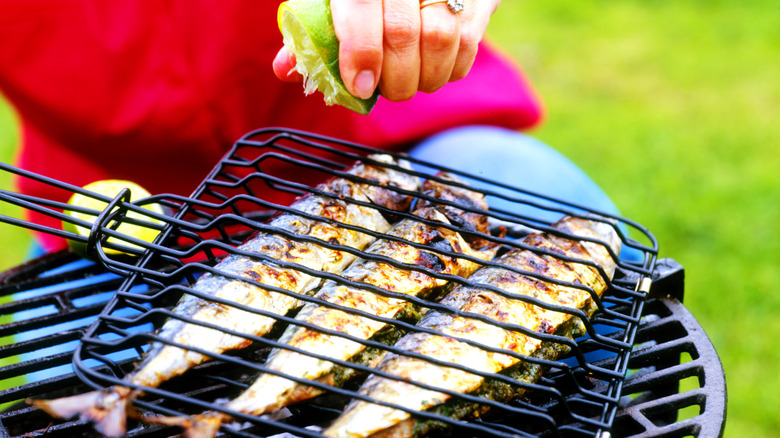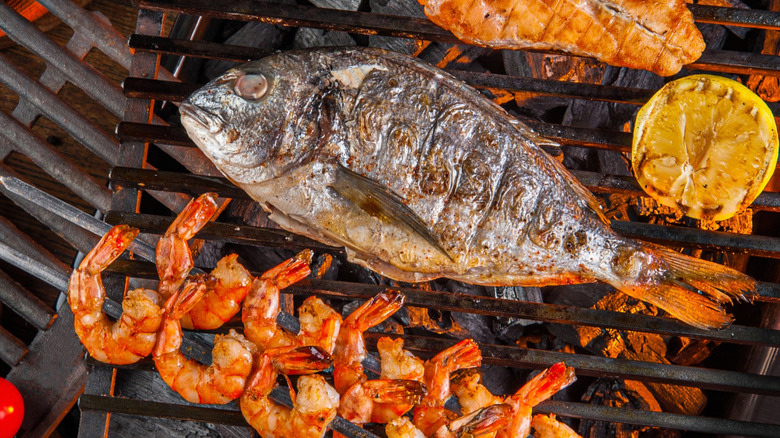Common Mistakes To Avoid When Grilling Whole Fish (And How To Fix Them)
Grilling fish is a guarantee to get that smoky flavor, crispy outer skin, and juicy inner meat all in one bite — but only if you cook it right. As simple as it seems, grilling a whole fish is a whole different ball game than cooking fillets, and can quickly turn into a kitchen nightmare if you aren't careful to avoid common grill mistakes. In an exclusive Food Republic interview, we talked with Laurent Tourondel, executive chef at L'Amico in New York City, who told us all about properly grilling fish and how not to fall victim to cooking common faux pas.
While it may seem natural to put all your focus on the fish itself, many common mistakes involve not properly attending to your grill. Whether it's preheating it properly, seasoning the grill ahead of time, or overcrowding your grill surface, chef Tourondel reminds those cooking at home that prepping your cooking instruments is just as important as prepping the food. Now this is not to say your fish doesn't deserve proper attention — because nobody likes dry and under-seasoned seafood. Tourondel simply makes it clear that dedicating a little extra time to your actual grill will lead to the ultimate success of your fish and help you avoid those basic mistakes that can slip your mind.
Don't over-grill your fish
It may seem obvious, but this can be tricky — especially with how fast fish can cook: Don't overcook your seafood! "One of the most common mistakes people make when grilling whole fish is leaving it on the grill for too long, which can result in a dry, overcooked fish," Tourondel said.
The solution? Knowing how long your fish should cook — and not going on minute over. While individual recipes may vary by fish species, the general rule is to grill your fish for eight to 10 minutes per inch of thickness — meaning the average one-inch fish will cook for four to five minutes on each side. So, avoid over-grilling by taking measurements ahead of time and keep your fish moist inside. If you've used an acidic marinade, you may need to cook it less — acid will denature the meat and lead to overcooking faster.
Preheat your grill correctly
Unlike ovens, you can't just turn a dial on your charcoal grill and know that it will preheat to an exact temperature, so extra care is required. According to chef Laurent Tourondel, not preheating your grill to the right temperature is another mistake fish grillers frequently encounter.
"A proper preheated grill or oven is essential for even cooking; otherwise, the fish takes longer to reach the desired internal temperature, leading to overcooking the outer layers while the center remains undercooked," he stated. Since most whole fish get grilled quickly on direct heat, it's best to preheat your grill somewhere between 500 to 600 degrees Fahrenheit, which can take around 15 minutes — so remember to build in this time to your meal prep. In fact, letting your grill come up to temperature may be the perfect time to prepare your fish for cooking.
Remember to season your grill
Yes, you read that correctly: Your grill needs seasoning too. This doesn't just mean coating the grates with non-stick spray, and it also doesn't mean throwing marinade or your whole spice cabinet onto the grill itself.
Chef Laurent Tourondel reminds at-home chefs that "it's important to coat the grill with sea salt and oil to help prevent the fish from sticking and to enhance the flavor." Knowing how to season your grill so that your food won't stick will not only help with safety and presentation but also allows you to add even more flavor that will seep into your fish as it cooks.
Choose a high-heat oil, like sunflower or canola, and only apply it after you have thoroughly cleaned the grates. Then, add your oil to both sides — but keep the sea salt to only the top where it will touch the fish.
Season your fish at the right time
While it may be common practice to season your fish before grilling, chef Tourondel knows the proper timing of seasoning a whole fish. "For optimal results, I recommend seasoning the outside of the fish halfway through the cooking process. After the fish has been on the grill for a while, you can pat it dry, brush it with olive oil, and then add additional seasonings."
Following this method maximizes flavor without burning the seasonings or outside of the fish, and helps keep your grill clean. Whether you're making a fish with lemon and herbs, or trying the classic red snapper with ponzu sauce, doing the bulk of your seasoning mid-cook will yield the best results. This way, the oil or your compound butter of choice won't burn the skin before the interior of your fish gets thoroughly cooked.
Don't overcrowd your grill
No matter what type of cooking you're doing, whether it's grilling a fish whole or griddling too many steaks, one universal rule remains constant: Do not let things get overcrowded. An overcrowded grill loses its heat more quickly, which messes up the cooking time and temperature.
Do you want to be left with an unsafe and unsatisfactory fish all because you tried to grill your vegetable side at the same time? Save yourself from the disappointment and give your whole fish the love and grill space it deserves and let it cook by itself. Remember, fish only needs a few minutes of cooking time per side, so save those sides until your seafood is done.

